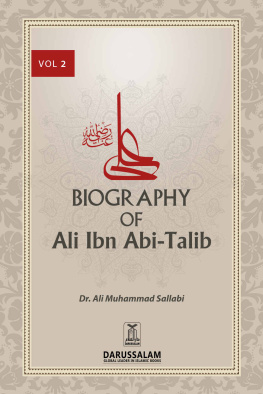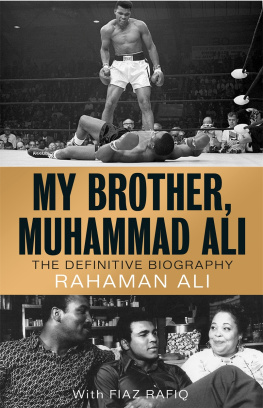No part of this book may be reproduced or utilized in any form or by any means, electronic or mechanical, including photocopying and recording or by any information storage and retrieval system, without the written permission of the publisher.
The Battles of the Camel and Siffin and the Matter of Arbitration

Allah (SWT) says:
And if two factions among the believers should fight, then make settlement between the two. But if one of them oppresses the other, then fight against the one that oppresses until it returns to the ordinance of Allah. And if it returns, then make settlement between them in justice and act justly. Indeed, Allah loves those who act justly. The believers are but brothers, so make reconciliation between your brothers. And fear Allah that you may receive mercy. (Al-Hujurat, 49: 9, 10)
It is narrated that Anas Bin Malik said: It was said to the Prophet (Peace and Blessings of Allah be upon him): Why dont you go to Abdullah Ibn Ubayy [and persuade him to accept Islam]? So he went to him, riding a donkey, and the Muslims set out too, and [they passed over] salty ground. When the Prophet (Peace and Blessings of Allah be upon him) came to him, he said: Do not come mear me, for by Allah the stench of your donkey offends me. One of the Ansar said: By Allah, the donkey of Allahs Messenger (Peace and Blessings of Allah be upon him) smells better than you. One of Abdullahs people got angry on his behalf, then the two groups got angry with one another and hit each another with palm branches, hands, and shoes. We heard that the following words were revealed concerning them:

And if two parties (or groups) among the believers fall to fighting, then make peace between them both. (Al-Hujurat, 49:9)
Al-Hasan narrated from Ali Bin Abi Talhah, who narrated from Ibn Abbas (May Allah be pleased with him), that he said [concerning the Statement],

And if two parties (or groups) among the believers fall to fighting, then make peace between them both. But if one of them outrages against the other, then fight you (all) against the one which outrages till it complies with the Command of Allh (Al-Hujurat,49:9)
Allah (SWT) commanded the Prophet (Peace and Blessings of Allah be upon him) and the believers that if two groups among the believers fight, they should call them to the ruling of Allah and reach a fair deal between them. If they resound, then they should be judged in accordance with the Book of Allah, so that the group that was wronged may settle scores with the group that wronged them. If they refuse to comply, then they have committed a transgression, and it is the duty of the leader of the believers to fight against them until they return to the command of Allah and accept the rule of Allah (SWT).
This means if two groups of Muslims fight, then the Muslim rulers must seek to reconcile between them by giving them advice, inviting them to Allah s rule, guiding them, and removing any doubts from their minds, as well as (address) the cause of difference (between them). Using the word if (in the Ayah) indicates that the believers should not fall into a fight. If it were to happen then that is the rare exception. The ones being addressed in the Ayah are the (Muslim) rulers, and the imperative command in it indicates that (the mentioned rule) is obligatory.
Al-Bukhari and others (i.e., scholars) used this (Ayah) as proof that the sin (of a Muslim) does not take him out of the fold of Islam, even if it is a major one, contrary to the view of the Kharijites who say that a Muslim who commits a major sin becomes a disbeliever and he is destined to the Hellfire (forever).
It is authentically reported in Sahih Al-Bukhari that Abu Bakr (May Allah be pleased with him) said: The Messenger of Allah (Peace and Blessings of Allah be upon him) gave a speech one day, and with him on the Minbar was Al-Hasan Ibn Ali (May Allah be pleased with him). The Prophet (Peace and Blessings of Allah be upon him) started to looking from him to the people, and said: This son of mine is a leader, and perhaps Allah will reconcile two great groups among the Muslims through him. It occurred as he (Peace and Blessings of Allah be upon him) said. Through him, Allah brought about reconciliation between the people of Sham and the people of Iraq, after the battles that took place between them.
Allah (SWT) then says:

And if two parties (or groups) among the believers fall to fighting, then make peace between them both. (Al-Hujarat, 49:9)
This means: If one of the two parties transgresses and exceeds its limit, and does not submit to Allah s rule and to the (rulers) advice, then it becomes incumbent upon the Muslims to fight the rebellious group until it returns to the ordinance of Allah in terms of not rebelling. Fighting is allowed with weapons and other means. The arbitrator should choose what will fulfill the obligation, which is the return (to the command of Allah). If the obligation is fulfilled without the use of weapons, then that is incumbent. If weapons are required then he should use them until they return (to the command of Allah).
Allah says:

But if one of them outrages against the other, then fight you (all) against the one which outrages till it complies with the Command of Allh (Al-Hujurat,49:9)
This means if the rebellious party leaves its rebellion after the fight and accept the command of Allah and His rule, then the Muslims must rule justly between the two parties.
They should try their best to reach the correct judgment that is in accordance with Allahs rule. They should punish the oppressive party until it leaves its oppression and fulfills its duties toward the other party, so that the fight does not repeat itself.

Then if it complies, then make reconciliation between them justly, and be equitable. Verily, Allh loves those who are the equitable. (Al-Hujurat, 49:9)
This is a commandment to be just in all matters.
Allahs Messenger (Peace and Blessings of Allah be upon him) said: Those who are just will be seated upon pulpits of light on the right of Allah, and both of His Hands are right Hands. They are those who are fair in their judgment, with their family, and with those under their authority.

